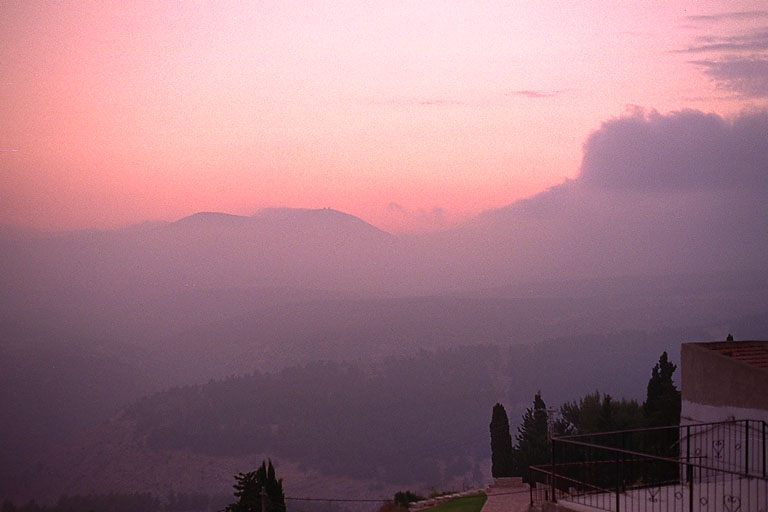Today’s run through Har Nof was a memory run. I ran past landmarks that I had not seen or thought of since we had moved 16 years earlier. Memories came flooding back as I reflected on a time when things seemed less complex. Of course, things didn’t turn out as I had expected.
Having switched to the Aish HaTorah kollel, and moved from the mixed national-religious and secular world of Mevaseret Tzion to Har Nof, my worldview had shifted as well. In place of my large kippah sruga came a black velvet kippah, and in time, I added a Borsalino. If I wasn’t quite charedi, I was closer to that world than to the modern-orthodoxy with which I had grown up. I had decided that the yeshiva world was the real deal, and left what I perceived to be the mediocrity of the MO world behind.
As I headed out into the cool Jerusalem air, I knew I’d stand out. I was wearing shorts and a bright blue sleeveless running shirt, which I hadn’t chosen to shock, although I was aware that short sleeves might have been better. The gentle breeze felt great and for the first time in awhile, I was excited to run by myself.
I passed Pachad Yitzchak, the Chaim Berlin kollel where I davened on a number of Shabboses. I had desperately wanted the authenticity that could be found within the walls of the kollel, but I’d never quite felt comfortable. My inability to finish pseukei d’zimra in time to start yishtabach with the chazzan, felt like a metaphor.
Soon, I passed the apartment where Rav Ovadiah Yosef ztl, had lived. I had seen the Rishon LeTzion only a few times when I lived here, but noted the absence of the Mercedes that had always reminded me of Rav Ovadiah. When the car had been stolen and brought to Palestinian territory, one call had brought it back, along with an apology.
Finally, I came to 20 HaKablan, the building in which we’d lived. While the apartment, which belonged to dear cousins, was nice, we had met few of the buildings residents and counted even fewer as friends. I thought of my neighbor who had insisted that we should give out son an upsherin, as it was minhag Yerushalayim, and of the cheder that their son was lucky to attend, considering that he had a working father.
I looked up at the porch where we had built our sukkah, in which I had slept with my father ob’m and son. I smiled as I thought of one year old Yehuda, innocently dropping pots off our balcony onto our neighbor’s porch below.
On the right, I passed the building where Rav Shlomo Fisher lives. While I had attended a few of his motzaei Shabbos shiurim, I had not known that he was well educated in Jewish and secular philosophy, something that was far from the norm in his world. Still, I knew that he was unusual in his willingness to teach Torah in tzioni yeshivot.
As I passed Neve, the seminary for post-collegiate women who were looking to discover their heritage, I almost expected to hear the shouts and shrieks that we frequently heard from our apartment each time a woman got engaged. I wondered about the changes that these women had made, and wondered what might have been had they explored their Judaism in other institutions.
Making a sharp right, I soon passed the GRA shul, where I had felt badly embarrassed when Rav Shternbuch had gruffly told me to speak in English, when he finally grew impatient with my broken Hebrew, as I attempted to ask a shaylah that I knew I didn’t even need to ask.
Further down the hill, I came upon Imrei Sheffer, the minyan factory, where I sometimes davened on Shabbos, despite the frequent talking that led me to think of an amusing “peshat” of a Shabbos zemer.
As I neared the turnaround point, I passed by my Rosh Yeshivah’s former apartment, where 24 years earlier, I’d felt tremendous joy as my friends from yeshivah congratulated me for making the game-saving tackle in a pre-Shabbos football game, leading to our yeshivah’s first victory. With, at best, average sport’s skills, it had felt good to be the hero for once.
Finally, I passed the small shopping area where Rochie shopped for groceries. I thought of her schlepping a baby stroller along with several bags of food, while climbing a street with a sharp incline. After one such trip, she’d gone into labor, and soon delivered our second son.
On the way back, despite the steep uphills, I felt freer and faster. As I got back to my starting point, I felt happy and stress-free, even as I heavily breathed in the now hotter Jerusalem air. I thought of the unpredictability of life, and of the young kollel avreich who had somehow morphed into the man I had become. As I wondered about what might have been, I felt no regrets.







